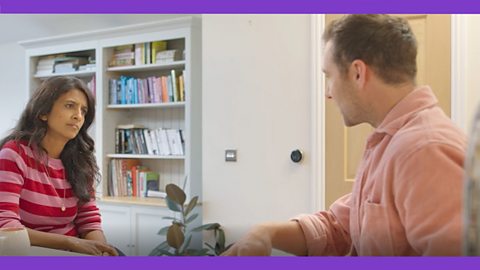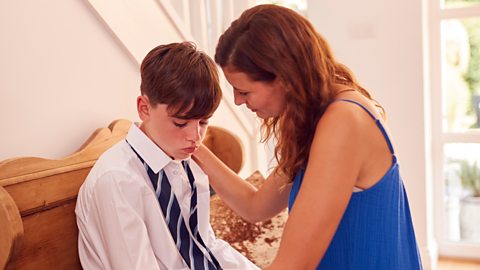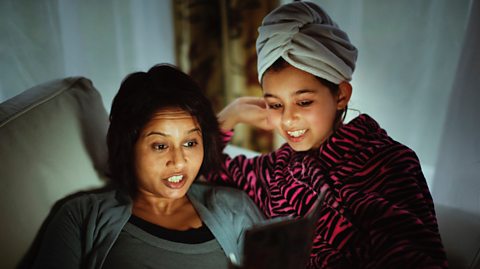We’re all familiar with the old saying “sticks and stones may break my bones but words will never hurt me.” However, we know that harsh words can be just as hurtful as physical bullying.
Konnie Huq and Harry Judd recount their experiences of being bullied in school and how they navigate bullying now that they have children of their own. Read on for expert advice to help you understand where bullying happens and how to tackle it…
Presenter Konnie Huq and McFly's Harry Judd discuss their experiences of bullying in school and as parents
Harry (00:00:00:00):Sticks and stones will break my bones, but words will never hurt me.That’s literally not true.
Konnie (00:00:03:22):No, that’s rubbish!
Harry (00:00:03:22):The complete opposite. Words are more painful.
Intro
Konnie (00:00:10:18):So, did you ever encounter bullying when you were growing up?
Harry (00:00:14:03):Yeah, definitely. In my second year of secondary school, I had a pretty difficult time. And actually, people turned on me, and I had a pretty tough year at school.To be honest, at the time, it was a really horrible experience.
Konnie (00:00:24:20):Yeah.
Harry (00:00:25:01):It was, I guess what you’d describe as psychological bullying.It was nothing physical, but I was just sort of shunned from the group.
Konnie (00:00:31:22):Yeah.
Harry (00:00:32:07):Suddenly, all the…
Konnie (00:00:32:23):And that scars deeply.
Harry (00:00:34:19):Yeah, I remember really experiencing thatfeeling of anxiety,and feeling low about it.
The main emotion I felt was shame, I felt quite ashamed and embarrassed.
Konnie (00:00:46:08):And it’s not just the playground, it’s on your way home from school,At your after-school clubs,
Harry (00:00:51:22):Yeah, my kids do football every Saturday, and I always go, take them along.And I think it’s interesting as well, watching them interact with the other kids.
Konnie (00:00:58:12):Yes.
Harry (00:00:59:01):I don’t think I’ve experienced it with mine yet.
Konnie (00:01:00:20):No.
Harry (00:01:00:19-00:01:02:01):Have you experienced it with yours?
Konnie (00:01:02:01):Well, it’s funny as you say that because there was an incident at school, where my son went to sit down with his tray of food. And this group of girls were like, sit here, sit here, so he went to sit there. And then they were like, actually no, sit here. And they thought it was going to be, he thought it was funny too.And so, the teacher had to say well actually, that’s not very nice. And she had to point that out to him as well as to them, because teasing like that has the scopeto become bullying.
Harry (00:01:31:05):And I guess as well, the schools have a level of responsibility as well right?And they’ll have like anti-bullying structures and those sorts of things.
Konnie (00:01:43:08):It’s good to chat to your child’s school and find out what their definition of bullying is and also, what their policy is to tackle it.
Where can bullying happen?
Bullying can occur in all kinds of spaces - at school, after-school clubs and even online and it can be difficult for parents to protect their children when they aren’t present in these spaces.
During Anti-Bullying Week, we spoke to Director of the Anti-Bullying Alliance, Martha Evans, on the environments bullying can take place in and how parents can help their child overcome it.
“Bullying can happen anywhere where children can communicate,” Martha explains.
“We find that bullying mostly happens in school, whether it be on the way to or from school, transitions between lessons in the corridors, or at break times on the yard.”
“Bullying can also happen online. It can be particularly scary when it happens online because people can do it anonymously. Sometimes people don't think about the impact of their actions when they do things online.”
Martha’s top tips to tackle bullying
1. Talk about bullying
It’s really important to start conversations about bullying with your children as early as possible. Talk about how we should treat each other. For younger children, it might be questions like…
‘What does a good friend look like?’
‘How does a good friend make you feel?’
‘What are the ways that some people might be different to you?’
‘How do you help someone if they are feeling sad?’
And when children get a bit older, you could start asking slightly more nuanced questions like…
‘When can bullying be a crime?’
‘What kinds of ways are cyberbullying and face-to-face bullying different?’
‘How would you report cyberbullying?’
Having these conversations before bullying occurs can really help when navigating it later.
2. Stay calm
It can be challenging to find out that your child is being bullied and you might become emotional, even angry, seeing them upset. It’s important to stay calm - the first thing to do is to really listen and reassure your child that coming to you was the right thing to do.
Assure them that the bullying is not their fault. You're never bullied because of who you are, you're bullied because of someone’s attitude towards you. Be kind to yourself too, it’s easy for parents to blame themselves but it’s not your fault either.
3. Establish the facts
Before taking any action, you need to establish the facts. Try to find out what occurred, how many times it happened, who was involved and where it took place. If the incident was online, make sure to take screenshots and try to keep that evidence. Keeping track of everything or creating a log can help when reporting bullying.
4. Talk to your child’s school and seek advice
Talk to your child’s school and find out what their bullying policy is - this will outline how the school might deal with it. It’s best to follow their policy to ensure things get worked out properly.
Don't encourage retaliation. It's completely understandable why you may think it’s a good idea, but it tends to have very unpredictable results. If a child who has been bullied tries to retaliate or do something, they often can find themselves in trouble with the school and it can even make the bullying worse.
5. Have fun outside of school
While school might be a difficult environment for your child, it’s important that they still have fun in their lives. Try to encourage your child to get involved with things they enjoy outside of school.
They could go to events they are interested in, start a hobby, or get involved with a youth group where they can meet other kids. This will help them make new friends and increase their confidence again.
If you notice your child is showing signs of serious distress like anxiety or depression, make an appointment with their GP.
For more information about Cyberbullying, head over to BBC Own It
CBBC have made some animations on the things your child can control around bullying - they're here on BBC iPlayer.
Martha Evans is Director of the Anti-Bullying Alliance
Anti-Bullying Week takes place from the 13 to 17 November and is organised by…
The Anti-Bullying Alliance in England and Wales
respectme in Scotland
The Northern Ireland Anti-Bullying Forum in Northern Ireland

More from BBC Bitesize Parents' Toolkit…
Parents' Toolkit
Fun activities, real-life stories, wellbeing support and loads of helpful advice - we're here for you and your child.

What are the signs of bullying?
Harry and Konnie discuss the signs of bullying, with tips on how to spot them from the Anti-Bullying Alliance.

How to help your child reach out about bullying
Equipping your child with the tools they need to open up and understand that they're not alone during these tough moments.

One in four children are bullied - what can parents do?
Psychologist Anjula Mutanda outlines how parents can spot signs of bullying, improve resilience and build confidence.

How to manage your child’s online world without clashing
Children and teens spend lots of time online for school and leisure, which can be a worry for parents. Here's some advice on managing your child’s screen time.

How to boost positivity for your family at home
It can be hard for a family to stay positive and motivated at the moment. Here are some tips from Dr Andrea Danese on how to fight negative feelings at home.
